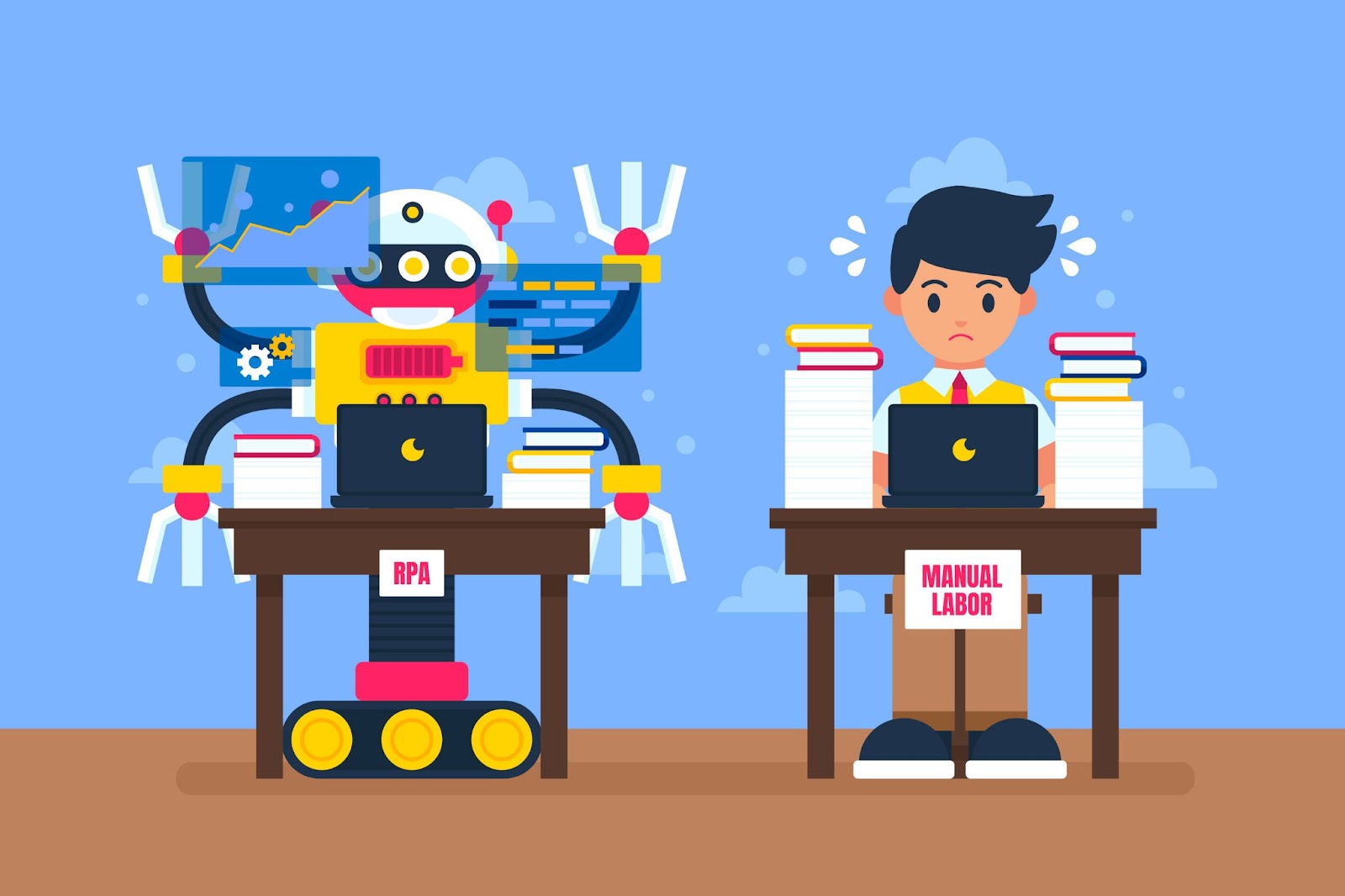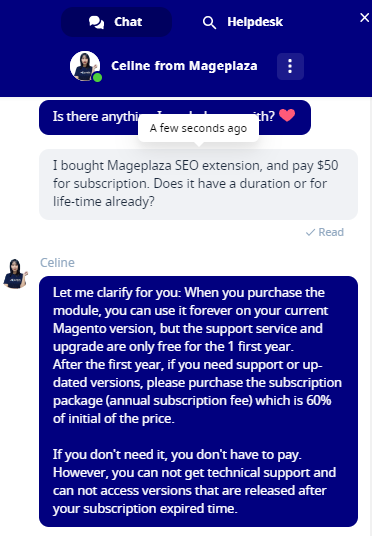Hyvä Theme is Now Open Source: What This Means for Magento Community - Mageplaza
Hyvä is now Open Source and free. Discover what changed, what remains commercial, how it impacts the Magento ecosystem, and how to maximize its full potential.

The digital landscape is rapidly transforming with the integration of artificial intelligence (AI), a revolution that introduces unprecedented capabilities and fundamentally changes traditional content marketing practices.
Based on the IBM Global AI Adoption Index, in 2022, a significant 35% of enterprises integrated AI into their operations. This indicates that over a third of companies are investing in AI to drive transformation, foster innovation, and gain a competitive edge. Furthermore, according to projections from Servion Global Solutions, by 2025, an overwhelming 95% of customer interactions are expected to be driven by AI.
This introduction explores how AI-driven content marketing not only enhances efficiency and personalization but also reshapes strategic approaches and operational processes, heralding a new era of digital marketing dynamics.
Implementing AI into your content marketing strategy can lead to significant transformations in various aspects of content creation, distribution, and performance optimization. Here’s how AI can revolutionize your content marketing strategy:
AI tools generate content ideas from trends and audience data, while Natural Language Generation models produce written content, saving time and resources.
AI optimizes content for readability, SEO, and tone, ensuring resonance with your audience.
AI algorithms analyze user data to offer personalized content recommendations, enhancing engagement and conversions.
Personalized campaigns and product suggestions tailored to user preferences further boost engagement.
AI-driven platforms analyze audience demographics and behavior to identify effective distribution channels.
Automated scheduling optimizes social media posts, ensuring content reaches the right audience at optimal times for maximum engagement.
AI analytics tools provide deeper insights into content performance, tracking metrics like engagement and ROI.
Predictive analytics leverage historical data to forecast future content performance, enabling marketers to refine strategies for better results.
AI tools find relevant content on the web, aiding marketers in discovering valuable material. Automated platforms compile curated content into newsletters and social media feeds, saving time.
AI content creation has evolved significantly in recent years, driven by advancements in natural language processing (NLP) and machine learning. Here’s an overview of the landscape as of early 2025:

Content Curation: AI sifts through vast content to tailor personalized recommendations based on user behavior and preferences. Used extensively on platforms like Netflix, Spotify, and Amazon, it suggests articles, videos, music, or products suited to individual tastes.
Language Translation: AI-driven services, like Google Translate and DeepL, have drastically improved, facilitating seamless communication across languages. Neural machine translation models grasp sentence context, yielding accurate and fluent translations.
Content Summarization: AI condenses long documents into concise summaries, preserving key information. This aids in digesting large volumes of data swiftly or generating abstracts for academic papers.
SEO Optimization: AI aids content creators by analyzing keywords, suggesting structural improvements, and identifying trending topics to enhance visibility and reach on search engines.
Image and Video Generation: AI, particularly Generative Adversarial Networks (GANs), creates realistic visual content, including images, videos, and deep fake media. AI Video Generator is becoming a popular tool for marketers and content creators due to their efficiency and high-quality outputs. Using an AI video editor helps brands stay competitive by producing engaging media quickly and at scale. This technology finds applications in content creation, design, and entertainment.
Content Personalization: AI analyzes user data to tailor content recommendations, email marketing, and website experiences, delivering more relevant and engaging content based on individual preferences and behaviors.
In its latest updates, Google clarified that not all AI-generated content is considered spam; rather, it can serve a legitimate purpose and may not necessarily manipulate search rankings.
To sum up, Google’s primary concern lies in the usefulness of content for readers, irrespective of whether it is generated by machines or written by humans.
In fact, Google consistently prioritizes content that exhibits expertise, experience, authoritativeness, and trustworthiness (E-E-A-T). It advises content creators to focus on delivering original, high-quality, and audience-centric content to enhance visibility in search results.
Here are several reasons why Google doesn’t distinguish between AI-generated and human-written content:
Google possesses algorithms that can distinguish between high-quality and low-quality content, operating discreetly in the background.
Google has robust mechanisms to combat the influx of poor-quality content, including its SpamBrain platform, which identifies spammy content effectively.
Google recognizes that AI-generated content can aid writers in creating exceptional content, thereby improving overall content quality
Will AI Take Over Human Writers’ Jobs?
The question of whether AI will take over human writers’ jobs is complex and multifaceted. While AI technologies are becoming increasingly sophisticated in generating content, there are several things that only humans can implement:
Creativity and Originality: Human writers possess a unique ability to infuse their work with creativity, intuition, and originality, elements that AI struggles to replicate. While AI can mimic certain writing styles and patterns, it often lacks the depth of emotion and nuanced storytelling that human writers bring to their work.
Emotional Intelligence: Human writers are adept at tapping into emotions and creating content that resonates with audiences on a deep level. They can evoke empathy, provoke thought, and inspire action through their writing, a skill that AI currently lacks.
Contextual Understanding: Human writers possess a deep understanding of context, culture, and societal nuances, enabling them to tailor their content to specific audiences and situations. AI may struggle to grasp the intricacies of context and produce content that is truly relevant and impactful.

Critical Thinking and Analysis: Human writers excel at critical thinking and analysis, allowing them to synthesize complex information, evaluate different perspectives, and present well-reasoned arguments. While AI can process vast amounts of data, it often lacks the ability to think critically and make informed judgments.
Adaptability and Flexibility: Human writers are inherently adaptable and flexible, capable of adjusting their writing style, tone, and approach to meet the needs of diverse audiences and platforms. AI, on the other hand, operates within predefined parameters and may struggle to adapt to changing circumstances or requirements.
Ethical and Moral Judgment: Human writers bring ethical and moral considerations to their work, ensuring that their content upholds principles of integrity, fairness, and social responsibility.
AI-powered tools can analyze vast amounts of data, trends, and user behavior to suggest topics and generate ideas for content creation. These tools can scrape the internet for popular topics, identify emerging trends, and even predict future content demand based on historical data and current patterns. By leveraging AI, content creators can ensure that their content is relevant and engaging to their target audience.

AI can assist in the initial drafting phase of content creation by generating outlines, writing rough drafts, and even suggesting language based on predefined parameters. Natural Language Generation (NLG) models can produce coherent and contextually relevant text, reducing the time and effort required for the initial writing process. Content creators can then refine and personalize this generated content to better suit their style and objectives.
AI algorithms can analyze content for readability, coherence, and engagement, providing feedback to human writers for refinement. AI tools like AI humanizers can refine AI-generated text into a more human-friendly tone, making it more acceptable for Google and other platforms. Additionally, AI tools can optimize content for search engines by suggesting relevant keywords, improving readability scores, and ensuring compliance with SEO best practices. This iterative process of refinement enhances the quality and effectiveness of the content.
AI-driven analytics platforms can analyze content performance metrics, user engagement, and audience behavior to provide actionable insights for optimization. These insights can inform content strategy, help identify opportunities for improvement, and guide decision-making to maximize the impact of content efforts. Furthermore, AI-powered SEO tools can assist in keyword research, content optimization, and competitor analysis, enabling content creators to enhance their content’s visibility and ranking in search engine results.
While AI can automate certain aspects of content creation, it lacks the human touch and creativity essential for producing truly compelling and authentic content. Human writers bring unique perspectives, emotions, and storytelling abilities that are challenging for AI to replicate.
To overcome this limitation, content creators should collaborate with AI as a tool to enhance their creativity and efficiency rather than relying solely on it.
AI-generated content may sometimes lack accuracy and reliability, especially when dealing with complex or nuanced topics. AI models can produce errors or misinformation if not trained properly or if they encounter unfamiliar contexts.
Content creators must ensure that AI-generated content undergoes thorough review and validation by human experts to maintain accuracy and reliability.
Ethical concerns arise regarding AI-generated content, particularly regarding plagiarism and the potential for misuse. AI tools can inadvertently produce content that closely resembles existing works, raising issues of intellectual property and originality.
Content creators must implement safeguards and ethical guidelines to prevent plagiarism and ensure the proper attribution of sources. Additionally, AI-powered plagiarism detection tools can help identify and address instances of content duplication.

The integration of AI in content creation reshapes traditional roles and responsibilities within the industry. While AI streamlines certain tasks and enhances efficiency, it also necessitates new skill sets and roles for content creators.
Professionals must adapt to the changing landscape by acquiring expertise in AI technologies, data analysis, and content strategy. Additionally, organizations should invest in training and upskilling initiatives to empower their teams to leverage AI effectively in content marketing efforts.
Future-proofing content marketing requires strategic integration of cutting-edge technologies, and at the forefront stands Artificial Intelligence (AI). By seamlessly blending AI into content strategies, businesses can unlock a myriad of opportunities - from personalized user experiences to data-driven insights. Let’s explore how AI integration is shaping the future of content marketing:
Continual exploration of emerging AI technologies and trends is essential for staying competitive in content marketing. This includes keeping abreast of advancements in AI-driven content generation, sentiment analysis, and content optimization tools. Additionally, monitoring developments in AI ethics, transparency, and regulation ensures responsible and ethical AI integration into content marketing practices.
Predictive content analytics and recommendation systems leverage AI algorithms to analyze user data and predict content preferences. By understanding audience behavior and interests, marketers can deliver personalized content recommendations that resonate with their target audience. Implementing AI-powered recommendation engines enhances user experience, drives engagement, and increases content effectiveness.
Generative AI-powered chatbots are revolutionizing customer engagement by providing instant, personalized interactions 24/7. These chatbots leverage natural language understanding and machine learning to simulate human-like conversations and address customer inquiries efficiently. Integrating AI-powered chatbots into content marketing strategies enhances customer satisfaction, streamlines communication processes, and nurtures relationships throughout the customer journey.

Augmented intelligence, combining human creativity with AI capabilities, streamlines content creation workflows and enhances productivity. AI tools assist content creators in tasks such as research, ideation, drafting, and optimization, allowing them to focus on higher-level creative tasks. By automating repetitive tasks and providing intelligent insights, augmented intelligence accelerates content production while maintaining quality and relevance.
AI’s role in content marketing is transformative, enabling marketers to create, optimize, and distribute content more effectively than ever before. By embracing AI integration, marketers can unlock new opportunities for personalization, efficiency, and innovation.
However, it’s essential to approach AI adoption thoughtfully, ensuring alignment with business objectives, ethical considerations, and the evolving needs of the audience. Ultimately, AI empowers marketers to elevate content marketing strategies, drive meaningful engagement, and achieve sustainable success in a rapidly evolving digital landscape.
As we navigate the future of content marketing, one thing remains certain: AI is not just influencing the game; it’s defining its future trajectory.